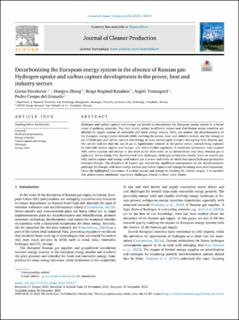| dc.contributor.author | Durakovic, Goran | |
| dc.contributor.author | Zhang, Hongyu | |
| dc.contributor.author | Knudsen, Brage Rugstad | |
| dc.contributor.author | Tomasgard, Asgeir | |
| dc.contributor.author | Crespo del Granado, Pedro Andres | |
| dc.date.accessioned | 2024-03-11T09:14:44Z | |
| dc.date.available | 2024-03-11T09:14:44Z | |
| dc.date.created | 2024-01-05T12:55:12Z | |
| dc.date.issued | 2023 | |
| dc.identifier.issn | 0959-6526 | |
| dc.identifier.uri | https://hdl.handle.net/11250/3121718 | |
| dc.description.abstract | Hydrogen and carbon capture and storage are pivotal to decarbonize the European energy system in a broad range of pathway scenarios. Yet, their timely uptake in different sectors and distribution across countries are affected by supply options of renewable and fossil energy sources. Here, we analyse the decarbonization of the European energy system towards 2060, covering the power, heat, and industry sectors, and the change in use of hydrogen and carbon capture and storage in these sectors upon Europe’s decoupling from Russian gas. The results indicate that the use of gas is significantly reduced in the power sector, instead being replaced by coal with carbon capture and storage, and with a further expansion of renewable generators. Coal coupled with carbon capture and storage is also used in the steel sector as an intermediary step when Russian gas is neglected, before being fully decarbonized with hydrogen. Hydrogen production mostly relies on natural gas with carbon capture and storage until natural gas is scarce and costly at which time green hydrogen production increases sharply. The disruption of Russian gas imports has significant consequences on the decarbonization pathways for Europe, with local energy sources and carbon capture and storage becoming even more important. Given the highlighted importance of carbon capture and storage in reaching the climate targets, it is essential that policymakers ameliorate regulatory challenges related to these value chains. | en_US |
| dc.language.iso | eng | en_US |
| dc.publisher | Elsevier B. V. | en_US |
| dc.rights | Navngivelse 4.0 Internasjonal | * |
| dc.rights.uri | http://creativecommons.org/licenses/by/4.0/deed.no | * |
| dc.title | Decarbonizing the European energy system in the absence of Russian gas: Hydrogen uptake and carbon capture developments in the power, heat and industry sectors | en_US |
| dc.title.alternative | Decarbonizing the European energy system in the absence of Russian gas: Hydrogen uptake and carbon capture developments in the power, heat and industry sectors | en_US |
| dc.type | Peer reviewed | en_US |
| dc.type | Journal article | en_US |
| dc.description.version | publishedVersion | en_US |
| dc.source.volume | 435 | en_US |
| dc.source.journal | Journal of Cleaner Production | en_US |
| dc.identifier.doi | 10.1016/j.jclepro.2023.140473 | |
| dc.identifier.cristin | 2221402 | |
| dc.relation.project | Norges forskningsråd: 296207 | en_US |
| dc.relation.project | Norges forskningsråd: 308811 | en_US |
| dc.source.articlenumber | 140473 | en_US |
| cristin.ispublished | true | |
| cristin.fulltext | original | |
| cristin.qualitycode | 2 | |

